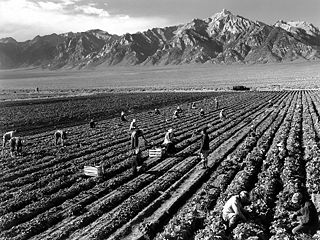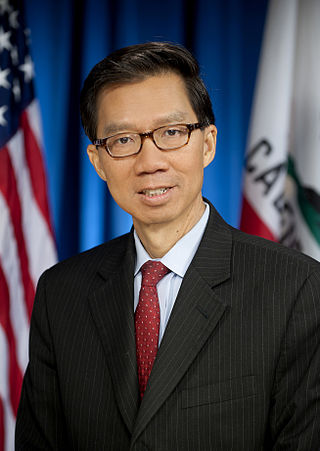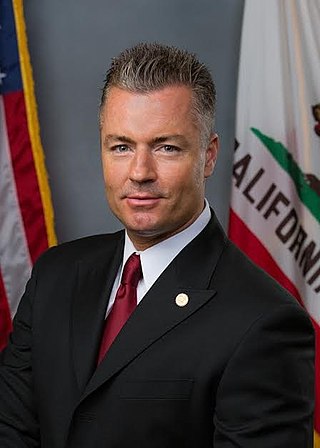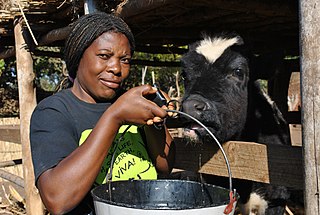
Gilbert Anthony Cedillo is an American politician, who served as a member of the Los Angeles City Council for the 1st district from 2013 to 2022. A member of the Democratic Party, Cedillo was previously a member of both the California State Assembly and the California State Senate.
The Reply is a legal document written by a Party specifically replying to a Responsive Declaration and in some cases an Answer. A Reply may be written when a Party or non-moving Party is asserting a counterclaim or the court has ordered a Reply.

Mark Leno is an American politician who served in the California State Senate until November 2016. A Democrat, he represented the 11th Senate district, which includes San Francisco and portions of San Mateo County. Before the 2010 redistricting, he represented the 3rd Senate district.

A farmworker, farmhand or agricultural worker is someone employed for labor in agriculture. In labor law, the term "farmworker" is sometimes used more narrowly, applying only to a hired worker involved in agricultural production, including harvesting, but not to a worker in other on-farm jobs, such as picking fruit.
The Unruh Civil Rights Act is an expansive 1959 California law that prohibits any business in California from engaging in unlawful discrimination against all persons (consumers) within California's jurisdiction, where the unlawful discrimination is in part based on a person's sex, race, color, religion, ancestry, national origin, age, disability, medical condition, genetic information, marital status, sexual orientation, citizenship, primary language, or immigration status.

The Fair Labor Standards Act of 1938 29 U.S.C. § 203 (FLSA) is a United States labor law that creates the right to a minimum wage, and "time-and-a-half" overtime pay when people work over forty hours a week. It also prohibits employment of minors in "oppressive child labor". It applies to employees engaged in interstate commerce or employed by an enterprise engaged in commerce or in the production of goods for commerce, unless the employer can claim an exemption from coverage. The Act was enacted by the 75th Congress and signed into law by President Franklin D. Roosevelt in 1938.

The California Labor Code, more formally known as "the Labor Code", is a collection of civil law statutes for the State of California. The code is made up of statutes which govern the general obligations and rights of persons within the jurisdiction of the State of California. The stated goal of the Department of Industrial Relations is to promote and develop the welfare of the wage earners of California, to improve their working conditions and to advance their opportunities for profitable employment."
The California Agricultural Labor Relations Act (CALRA) is a landmark statute in United States labor law that was enacted by the state of California in 1975, establishing the right to collective bargaining for farmworkers in that state, a first in U.S. history.

Brian Maienschein is an American attorney and politician currently serving in the California State Assembly, representing the 77th district, encompassing parts of northeastern San Diego since 2012. Prior to serving in the state assembly, he was a member of the San Diego City Council, and the city's first Commissioner on Homelessness. He is most known for his response to two wildfires in his district, the 2003 Cedar Fire and the 2007 Witch Creek Fire, as well as for the completion of California State Route 56 and the preservation from development of 10,000 acres in the San Pasqual Valley.

Human trafficking in California is the illegal trade of human beings for the purposes of reproductive slavery, commercial sexual exploitation, and forced labor as it occurs in the state of California. Human trafficking, widely recognized as a modern-day form of slavery, includes
"the recruitment, transportation, transfer, harboring or receipt of persons by means of threat or use of force or other forms of coercion, of abduction, of fraud, of deception, of the abuse of power, or of a position of vulnerability or of the giving or receiving of payments or benefits to achieve the consent of a person having control over another person, for the purpose of exploitation. Exploitation shall include, at a minimum, the exploitation of prostitution of others or other forms of sexual exploitation, forced labor services, slavery or practices similar to slavery, servitude or the removal of organs."

Marc Levine is an American politician, who served in the California State Assembly representing the 10th district between 2012 and 2022. A member of the Democratic Party, Levine is the former Chairman of the California Legislative Jewish Caucus. A former member of the San Rafael City Council, Levine previously worked as a technology entrepreneur.

Edwin “Ed” Chau is an American jurist and politician who served in the California State Assembly as a Democrat representing the 49th state assembly District from 2012 to 2021. On November 29, 2021, California Governor Gavin Newsom appointed Chau to be a judge in the Los Angeles County Superior Court.

Travis Ethan Allen is an American politician who served as a Republican member of the California State Assembly. Allen was first elected in November 2012 to represent California's 72nd State Assembly district, which includes the cities of Fountain Valley, Los Alamitos, Seal Beach, and Westminster, most of Garden Grove, portions of Huntington Beach and of Santa Ana, and the unincorporated communities of Midway and Rossmoor.

Lorena Sofia Gonzalez Fletcher is an American union leader and former politician. A Democrat, she served in the California State Assembly from 2013 to 2022, representing the 80th Assembly District, which encompasses southern San Diego. She was first elected to the Assembly in a 2013 special election to succeed Ben Hueso, who was elected to the State Senate in a special election.

Jim Wood is an American politician currently serving in the California State Assembly. He is a Democrat representing the 2nd Assembly District, which encompasses all of Del Norte, Trinity, Humboldt and Mendocino counties, plus northern and coastal Sonoma County, including the northern half of Santa Rosa.

Miguel Santiago is an American politician, currently serving in the California State Assembly, where he serves as chairman of the Communications and Conveyance Committee. Santiago is a Democrat representing the 54th Assembly District, which encompasses parts of Downtown Los Angeles, along with East Hollywood, Boyle Heights, Montebello, Commerce, and Vernon.

Jordan Cunningham is an American attorney and politician who represented the 35th district in the California State Assembly. He is a Republican who was elected in November 2016. Cunningham's district encompassed San Luis Obispo County and portions of Santa Barbara County. Prior to being elected to the state assembly, he was a school board trustee for the Templeton Unified School District and a Deputy District Attorney for San Luis Obispo County.

Jesse Samuel Gabriel is an American attorney and politician serving as a member of the California State Assembly. Gabriel represents the California's 46th State Assembly district, which includes much of the eastern San Fernando Valley, including Encino, Tarzana, Reseda, and Van Nuys.

The 2021–2022 session is the current session of the California State Legislature. The session first convened on December 7, 2020.

Farmworkers in the United States have unique demographics, wages, working conditions, organizing, and environmental aspects. According to The National Institute for Occupational Safety & Health in Agricultural Safety, approximately 2,112,626 full-time workers were employed in production agriculture in the US in 2019 and approximately 1.4 to 2.1 million hired crop workers are employed annually on crop farms in the US. A study by the USDA found the average age of a farmworker to be 33. In 2017, the Department of Labor and Statistics found the median wage to be $23,730 a year, or $11.42 per hour.

















